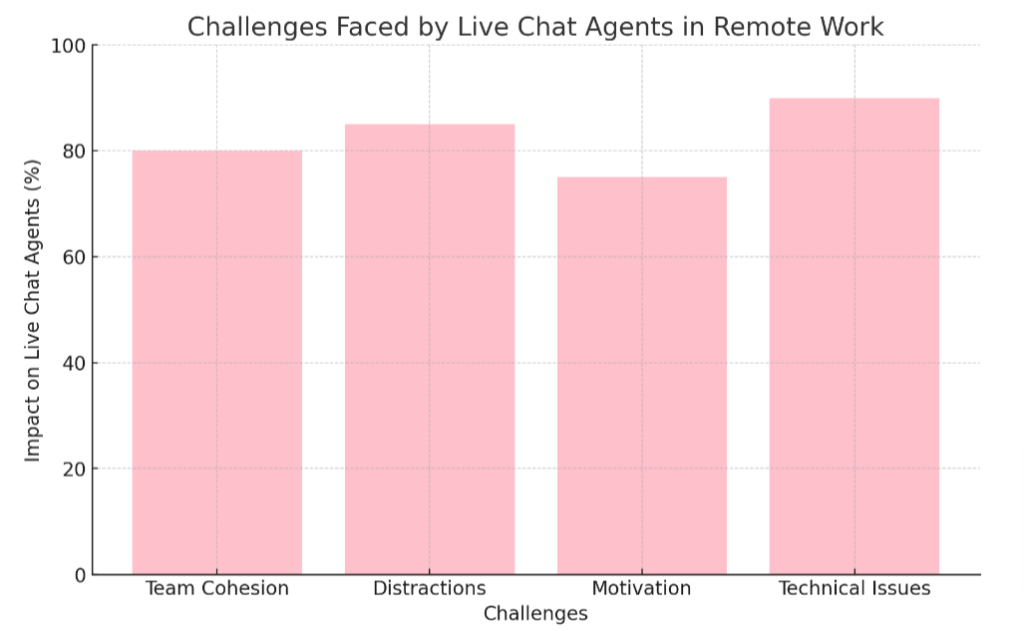Navigating Remote Work Policies as a Live Chat Professional
Working from home can be a puzzle for live chat agents who want to stay on top of their game. Today, over half of customer service teams include remote workers. This article unpacks the essentials you need to know about remote work policies and how they affect your role as a live chat agent.
Dive in for the keys to success!
Key Takeaways
- Remote work chat support allows agents to provide customer service from any location with an internet connection, becoming popular for its flexibility and cost-savings.
- Live chat agents need strong written communication skills, familiarity with customer service principles, a reliable internet connection, and proficiency in typing to excel in remote roles.
- Companies benefit from remote work by saving on overhead costs like office space and gaining access to a broader talent pool without the expense of relocation or travel.
- Challenges for remote live chat agents include maintaining team cohesion, managing distractions at home, staying motivated without direct supervision, and handling technical issues efficiently.
- Best practices for success as a remote live chat agent include proper training, creating an ergonomic home workspace free from distractions, effective communication with customers and teammates, managing virtual teams well through clear guidelines and goals, and keeping up-to-date with industry trends.
What is Remote Work Chat Support?
Remote work chat support refers to the provision of customer service and assistance through live chat platforms from a remote location. It has become increasingly popular in recent years due to its flexibility and cost-saving benefits for companies.
Definition and history
Remote work chat support refers to customer service roles where agents assist customers through text-based live chat platforms. Unlike traditional in-person or phone-based services, these remote agents can help from virtually any location with an internet connection.
This form of customer assistance began gaining popularity in the early 2000s as businesses recognized the potential for providing real-time responses without geographical constraints.
Initially adopted by tech companies, it’s now a widespread feature across various industries.
The concept has roots dating back to the late ‘60s and early ‘70s when telecommuting was first coined and conceptualized as work that could be done remotely, not necessarily tethered to a centralized office.
With advancements in internet technology during the ‘90s and into the new millennium, chat support became more feasible and effective as a legitimate means for conducting business communication.
Live chat roles have significantly evolved since then, growing from simple message exchanges to complex interactions that encompass sales, technical support, and customer relationship management.
Types of remote work chat jobs
Live chat agents enjoy a variety of remote work opportunities. These positions let you assist customers from virtually any location.
- Customer Support Representative: You’ll answer questions, offer solutions, and provide help for customers via live chat software. This role is perfect for solving problems and ensuring customer satisfaction.
- Technical Support Specialist: Your job involves troubleshooting technical issues for products or services. Clear explanations and step-by-step guidance are key in this position.
- Sales Associate: Chat agents in sales engage with potential buyers, recommending products based on needs and handling transactions.
- Billing Support Advisor: If numbers are your thing, this role focuses on assisting customers with billing inquiries and payment issues.
- Account Management Assistant: Working closely with account managers, you’ll help maintain client relationships and resolve account-related queries through chat.
- Online Consultant: Specialize in advice within your expertise area, supporting customers who seek guidance or information through the chat function.
- Multilingual Chat Support Agent: For those fluent in other languages, this job entails providing customer service to non-English speaking users across various time zones.
- Social Media Chat Specialist: Harnessing the power of social platforms, you’ll respond to queries and manage conversations that take place via social media messaging features.
Requirements for remote work chat jobs
Different types of remote work chat jobs call for a variety of skills and tools. To succeed in these roles, live chat agents need to meet certain requirements. Here’s what you should have under your belt:
- Strong written communication skills are key. You must be able to convey clear, concise messages to customers.
- Familiarity with customer service principles is crucial. You’ll need to understand how to handle inquiries and resolve issues effectively.
- A reliable internet connection ensures you stay connected with your team and customers at all times.
- Proficiency in typing is a must. Fast and accurate typing speeds up response times and improves customer satisfaction.
- Aptitude for using multiple platforms simultaneously comes in handy when juggling conversations across different channels.
- Knowledge of the company’s products or services helps provide accurate information to customers.
- Being self – motivated is essential when working without direct supervision.
- A quiet workspace free from distractions supports focus and promotes professionalism during interactions.
- Trusted software and hardware, including a computer that can run communication tools, is non – negotiable for delivering smooth service.
- Skills in multitasking enable you to manage several conversations efficiently without compromising quality.
Benefits of Remote Work Chat Support
Remote work chat support offers flexibility and work-life balance, increases job opportunities, and provides cost savings for companies.
Flexibility and work-life balance
Remote work chat support offers live agents the flexibility to create a work schedule that aligns with their personal lives, promoting a better work-life balance. This setup allows them to manage household responsibilities, attend appointments, and partake in other activities without compromising their professional duties.
Establishing clear boundaries between work and personal time becomes easier, contributing positively to overall job satisfaction and mental well-being.
This form of remote employment brings forth increased job opportunities for those seeking more flexible or non-traditional arrangements. Live chat agents can cater to a global clientele from the comfort of their homes or preferred workspace, eliminating commute times and expenses while affording more time for family, hobbies, or self-care activities.
Increased job opportunities
Transitioning from the flexibility and work-life balance that remote work chat support offers, live chat agents can also benefit from increased job opportunities. Companies are increasingly seeking skilled individuals with expertise in virtual customer service to manage their remote live chat teams.
As businesses expand their online presence, they require efficient agents who can maintain high levels of customer satisfaction while working remotely. This trend opens up numerous job prospects for live chat agents, allowing them to explore various roles and industries while enjoying the flexibility of remote work.
Live chat agents who excel in providing exceptional customer service have the opportunity to work with a diverse range of companies across different sectors such as e-commerce, technology, healthcare, and finance.
Additionally, the rising demand for virtual communication tools has created openings for live chat operators within call centers and third-party service providers specializing in remote customer support.
Cost savings for companies
Companies can save on overhead costs by allowing customer service agents to work remotely. This eliminates the need for physical office space and reduces expenses related to utilities, maintenance, and office supplies.
Additionally, remote work enables companies to access a larger talent pool without incurring relocation or travel expenses, resulting in cost-effective hiring processes.
Furthermore, remote work policies allow companies to reduce employee turnover rates by providing flexibility and accommodating individual needs. This results in savings from recruiting, training, and onboarding new employees.
Challenges of Remote Work Chat Support
Maintaining communication and team cohesion, potential distractions and lack of motivation, and technical issues are common challenges faced by remote chat agents. To learn more about overcoming these challenges, keep reading!

Maintaining communication and team cohesion
To maintain communication and team cohesion in remote work chat support, use various digital tools such as video conferencing, instant messaging, and project management platforms. Regular virtual team meetings should be scheduled to align goals and expectations, fostering a sense of unity among agents.
Quick response times through chat or email can also help keep communication flowing smoothly. Encouraging open dialogue and feedback within the team helps build trust and camaraderie among remote live chat agents.
Ensuring that all team members are aware of their roles and responsibilities is crucial for maintaining clear communication channels. Setting up guidelines for availability hours, response times, and escalation procedures will also help in streamlining operations for remote customer service teams.
Potential distractions and lack of motivation
Potential distractions and lack of motivation can be common challenges for remote chat agents. It’s essential to create a dedicated workspace, free from interruptions, to maintain focus during working hours.
Setting clear boundaries with household members can help minimize disruptions. Additionally, establishing a routine and adhering to regular breaks can combat feelings of isolation and maintain productivity levels.
Furthermore, staying connected with colleagues through virtual meetings or chat platforms can boost morale and motivation.
Maintaining engagement is crucial when external factors might impact motivation. Incentivizing performance through recognition programs or setting achievable goals can enhance job satisfaction for remote chat agents.
Technical issues
Transitioning from potential distractions and lack of motivation to technical issues, live chat agents may encounter various challenges related to technology while working remotely.
Connectivity problems, software glitches, and hardware malfunctions can disrupt the flow of providing seamless customer support. Troubleshooting technical issues requires quick thinking and problem-solving skills to ensure uninterrupted communication with customers.
Staying updated on the latest technological tools and platforms is crucial for remote chat agents to effectively navigate through potential hurdles in their virtual work environment.
Best Practices and Tips for Remote Work Chat Agents
Remote work chat agents can benefit from effective communication, proper training, creating a suitable work environment, managing virtual teams, and staying updated on industry trends.
These best practices are essential for success in remote chat support roles.
Effective communication and multitasking
Live chat agents need to excel in effective communication and multitasking skills to succeed in a remote work environment. Here are some best practices to keep in mind:
- Use clear and concise language to ensure customers understand the information provided, using keywords relevant to their inquiries.
- Multitask efficiently by managing multiple customer interactions simultaneously, without compromising on quality or response time.
- Employ active listening techniques to understand customer needs and provide personalized support.
- Utilize empathy and patience to address customer concerns and build rapport, even during high – pressure situations.
- Adapt communication styles based on customer preferences and needs, ensuring a positive interaction for each individual.
Proper training and onboarding
Transitioning from effective communication and multitasking, proper training and onboarding play a crucial role in equipping remote work chat agents with the necessary skills and knowledge. Here are essential elements to consider:
- Comprehensive training programs that cover customer service etiquette for remote agents, emphasizing the use of communication tools and technology for remote live chat support.
- Training sessions focusing on performance metrics for remote chat agents, ensuring they understand the expectations and responsibilities of a live chat agent.
- Development opportunities that enable live chat agents to stay updated on industry trends, providing them with the tools and resources needed to excel in their roles.
- Onboarding processes designed to introduce newly hired chat support agents to remote work policies, guidelines, and procedures from the outset of their employment.
- Incorporating virtual team leadership into training modules, preparing live chat agents for managing virtual teams effectively in a remote work environment.
- Ongoing support and mentorship programs that assist live chat agents in managing potential challenges associated with remote work, enabling them to thrive in their roles as valuable team members.
Creating a suitable work environment
To create a suitable work environment for remote chat agents, consider the following:
- Setting up a designated workspace in a quiet area where interruptions are minimal.
- Ensuring the workspace is well – lit and ergonomically comfortable to support long hours of sitting.
- Using noise – canceling headphones or background music to minimize distractions.
- Implementing a reliable internet connection and backup plans in case of outages.
- Utilizing collaborative tools for efficient communication with team members.
- Scheduling regular breaks to avoid burnout and maintain productivity.
- Incorporating elements of personalization to make the workspace enjoyable and conducive to focus.
Managing virtual teams
Managing virtual teams involves:
- Setting clear expectations and goals to keep everyone aligned.
- Utilizing project management tools for efficient task assignment and tracking progress.
- Establishing regular communication channels to foster teamwork and collaboration.
- Providing ongoing support, feedback, and recognition to keep team members motivated.
- Encouraging open dialogue and brainstorming sessions to generate innovative ideas.
Staying updated on industry trends
To excel in remote chat support, staying updated on industry trends is crucial. Upholding your knowledge of the latest customer service technologies and methodologies equips you to provide top-notch assistance to customers.
With advancements constantly shaping the industry, keeping abreast of changes in consumer behavior, preferences, and expectations is essential for delivering exceptional live chat support.
Engaging with industry publications, attending webinars, and participating in relevant forums are effective ways to stay informed about the latest trends and developments in customer service.
Conclusion.
In conclusion, understanding and implementing remote work policies is crucial for live chat agents. Adapting to virtual customer service requires effective communication, multitasking skills, and staying updated on industry trends.
By following best practices and guidelines for remote work, chat support agents can enhance their performance and contribute to the success of virtual teams. Embracing the responsibilities and expectations of remote work empowers live chat agents to thrive in a telecommuting environment.

